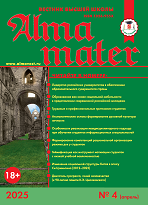UDC 378:316.6
Filipp Yu. Kushnarev, Cand. Sci. (Politics), Docent, Department of Social Policy at Yaroslavl State University n.a. P.G. Demidov, e–mail: kushnarevcustoms@mail.ru
The article analyzes the attitude of sociology students towards their chosen specialty and future profession. The author conducted a sociological study among students studying sociology in leading universities of the country. It was found that girls, unlike boys, rely on the advice of their family, relatives, and friends when choosing their field of study and university. It was also established that master's students, unlike undergraduate students, rely primarily on the advice of friends and acquaintances when choosing their field of study and university, rather than the opinions of their family and relatives. Only about one third of the students believe that the profession of ‘sociologist’ is in demand on the job market. Thus, the majority of students believe that the knowledge, skills, and abilities obtained in the university correspond to the requirements of the modern market. It has been found that the quality of education in the university affects the attitude towards the chosen specialty and future profession. The lower the quality of teaching at the university, the more likely it is that the sociology student will become disappointed in the chosen specialty and profession. It has been established that only a small proportion of students who (unconsciously) enrolled in the sociology program decided to work in the field after completing their studies. It has been established that male students, unlike female students, strive to secure more prestigious (status-oriented) jobs in government or municipal service after graduation, despite their lower pay. For them, status is more important than money. On the other hand, female students aim to get jobs that are not necessarily prestigious, but better paying (such as firms conducting marketing research, etc.). For senior-level students and master’s degree students in sociology, the most important aspect of their future job as a sociologist is the opportunity to influence important decisions in their region or country. First year students aspire to become sociologists mainly because it is a well-compensated profession. Measures aimed at improving career guidance activities are proposed.
Keywords and phrases: profession image, sociologist, motives for choosing a field of study, professional self-determination, graduate career orientation.
References
1. Abramov, V.O., Lychkina, A.V., Sloboda, N.M., Titova, D.V. Soviet (Russian) sociology: six professional generations of sociologists. Vestnik of young scientists and specialists of Samara University. 2020. No. 2 (17). P. 16–22.
2. Sillaste, G.G. To the 60th anniversary of the Russian Society of Sociologists and to the 23rd anniversary of teaching sociology at the Financial University. Humanities. Vestnik Finansovogo universiteta. 2019. V. 9. No. 1 (37). P. 6–13.
3. Mansurov V.A., Pronina E.I., Yuriev, P.S. To the 60th anniversary of the Soviet Sociological Association/Russian Society of Sociologists (SSA/ROS). Scientific Result. Sociology and Management. 2018. V. 4. No. 4. P. 16–27.
4. Potapova, I.M. Professional self-determination of students of sociological profile: the path of sociologist or marketer. In: Growth or recession: socio-humanitarian trends. Collection of scientific articles of undergraduate, graduate and postgraduate students. Moscow, 2020. P. 315–331.
5. Popov, E.A. Future profession of sociologist: expectations of applicants. Sociodynamics. 2020. No. 10. P. 46–55.
6. Chikarova, G.I. Mission of the sociologist in the modern Russian society. Humanitarian of the South of Russia. 2020. V. 9. No. 6. P. 131–137.
7. Bulanova, M.B. Sociology and sociologists at the faculties of social sciences of Russian universities (historical sketch). Nasledie. 2018. No. 2 (13). P. 91–105.
8. Bulanova, M.B. Sociology and sociologists at the Faculty of Social Sciences of the State Smolensk University. Nasledie. 2020. No. 1 (16). P. 93–105.
9. Siza, R. La professione del sociologo tra sviluppo e diffusione della Sociologia [The Profession of sociologist between development and dissemination of Sociology]. Sociologia Italiana (AIS Journal of Sociology). 2014, April. Vol. 1. Р. 167–181.
10. Talanov, S.L. Russian sociologists: sociological analysis of the formation of the profession. Alma Mater (Vestnik vysshey shkoly). 2015. No. 5. P. 26–32.
11. Zhuravleva, M.S. Influence of modern sociologists on society. In: New science and the formation of knowledge culture of modern man: a collection of scientific papers. S.V. Kuzmin (ed.). Kazan, 2018. P. 163–165.
12. Skvortsov N.G., Zyryanov V.V. Sociological education: between standards and realities. Sociological Studies. 2018. No. 7. С. 30–40.
13. Kushnarev, F.Yu., Berezin, D.T., Rumyantseva, E.S. Impact of COVID–19 on the system of higher education. Alma Mater. Vestnik vysshey shkoly. 2020. No. 10. P. 12–22. DOI: 10.20339/AM10–20.12











.png)






